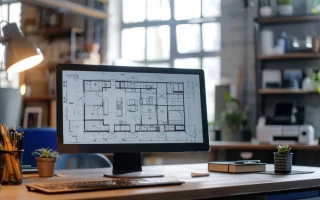Your dream home or major renovation project is a significant financial and emotional investment. An architect is your partner in transforming your vision into a functional and beautiful reality. The right architect can not only bring your ideas to life but elevate them and guide you around potential pitfalls. However, choosing the wrong architect could lead to costly delays, design frustrations, and a final product that needs to meet your expectations.
That’s why it’s crucial to avoid these common mistakes during the hiring process:
Mistake 1: Focusing Solely on Price
While costs are an important factor, resisting the temptation to go with the lowest bidder is essential. A bargain-basement price may sound tempting initially, but it could indicate several red flags. Perhaps the architect needs to be more experienced, or they intend to cut corners on materials or services. Sarah and Jim were excited to renovate their kitchen. They found an architect offering incredibly low rates. Thrilled with the “deal,” they hired him. However, in mid-project, the architect revealed he used substandard materials and changed his design multiple times, resulting in delays and unexpected fees. By the end, their “budget” renovation cost far more than anticipated and was filled with compromises they regretted.
Remember, you often get what you pay for. It’s far more cost-effective to invest in a skilled and experienced architect upfront because expensive revisions and fixes down the line will cost you significantly more.
Instead of focusing solely on price, look for value. Consider the architect’s experience, reputation, and portfolio of past work. Request detailed proposals outlining their fees, the full scope of services, and project timelines. This will give you a clearer picture of the overall investment and allow you to compare apples to apples.
Mistake 2: Neglecting to Define Your Project Scope
Before reaching out to architects, having a clear idea of what you want is crucial. This doesn’t require a complete set of blueprints, but you should be prepared to define the basics:
- Project Type: New build, home addition, kitchen renovation, etc.
- Size: Approximate square footage involved.
- Style: Preferences for traditional, modern, or another style.
- Budget: A realistic ballpark range.
The more defined your vision is, the easier it is for an architect to determine if they are the right fit. A lack of clarity can save everyone’s time and contribute to mismatched expectations.
Mistake 3: Not Checking Credentials and References
Hiring someone without proper vetting is never a good idea, especially for major projects. Take time to verify an architect’s credentials. Are they licensed in your state? Do they have any specialty certifications like LEED accreditation for sustainable design? Thoroughly check their website, portfolio, and online reviews. Consider the case of the Anderson family. They neglected to verify their architect’s credentials. Turns out, he wasn’t licensed in their state. This caused problems with permits, and worse, when structural issues emerged, they had no legal recourse against him.
Most importantly, request references from past clients. Contact those clients directly and ask questions about the architect’s communication style, how they handled challenges, and if they were satisfied with the final outcome.
Mistake 4: Skipping the Chemistry Check
You’ll be spending a significant amount of time working closely with your chosen architect. Compatibility is essential for smooth communication and a positive experience. During interviews, pay attention to your overall interaction. Do you feel comfortable asking questions? Does the architect listen to your concerns and offer thoughtful solutions? Are their ideas and working style in sync with your own?
A good personality fit can make all the difference in the success of your project. As the saying goes, you can always teach skills, but you can’t teach personality.
Mistake 5: Rushing the Decision
Finding the right architect takes time. Resist the urge to make a hasty decision just to get things moving. Interview multiple architects, compare proposals carefully, be bold, and ask detailed questions. Consider this a crucial part of your project planning.
The Importance of a Clear Contract
Once you’ve chosen your architect, a comprehensive contract is essential to protect all parties. A study by Sweeten, a contractor-matching platform, revealed that contracts are vital – projects with clear contracts have fewer change orders and are more likely to be finished on time. The contract should explicitly outline the following:
- Scope of Work: A detailed description of all services the architect will provide.
- Fees and Payment Schedule: How and when will the architect be paid?
- Timeline: Estimated deadlines for crucial milestones.
- Termination Clause: Conditions under which either party can terminate the agreement.
Finding the Right Fit
By avoiding these common mistakes and prioritizing clear communication and careful vetting, you’ll increase your chances of finding an exceptional architect—especially coastal architects for waterfront projects—who can bring your dream to life.
Remember, the right architect won’t just design a building; they’ll create a space that perfectly reflects you and your lifestyle.






